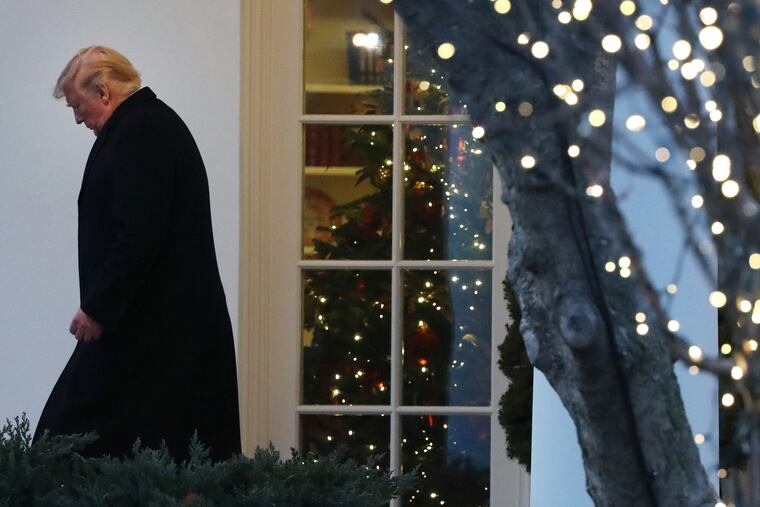White House official directed hold on Ukraine aid shortly after Trump’s July 25 call with Zelensky
An official from the White House budget office directed the Defense Department to "hold off" on sending military aid to Ukraine less than two hours after President Donald Trump's controversial phone call with Ukrainian President Volodymyr Zelensky, according to internal emails.

An official from the White House budget office directed the Defense Department to "hold off" on sending military aid to Ukraine less than two hours after President Donald Trump's controversial phone call with Ukrainian President Volodymyr Zelensky, according to internal emails.
Michael Duffey, a senior budget official, told Pentagon officials that Trump had become personally interested in the Ukraine aid and had ordered the hold, according to the heavily redacted emails, obtained by the Center for Public Integrity on Friday in response to a Freedom of Information Act request. He also asked the Pentagon not to discuss the hold widely.
"Given the sensitive nature of the request, I appreciate your keeping that information closely held to those who need to know to execute the direction," Duffey wrote in a July 25 email to Pentagon Comptroller Elaine McCusker and others.
The new emails shed light on the opaque and unorthodox process by which the Trump administration withheld almost $400 million in aid from Ukraine at the same time the president and some of his political allies were pushing Zelensky to investigate Democrats. On Wednesday, the House of Representatives voted to impeach Trump for abuse of power and obstruction of Congress, charging the president with leveraging U.S. military aid to solicit foreign interference in the 2020 election and blocking congressional attempts to conduct oversight.
The White House did not immediately respond to a request for comment.
In one of the emails, Duffey indicated Trump began asking about the aid Congress had appropriated for Ukraine after seeing a June 19 article in the Washington Examiner with the headline "Pentagon to send $250M in weapons to Ukraine."
The haphazard process continued throughout the summer, the emails show, including on the same day that Trump spoke with Zelensky and requested a "favor" after the Ukrainian president said he was ready to purchase anti-tank missiles from the United States. That phone call, which took place at about 9 a.m. on July 25, was followed by Duffey's email directing the hold at 11:04 a.m. Some administration officials testified that they had learned of the hold, which blocked money from being appropriated by the State Department and the Defense Department, in early July.
The emails also show that some Pentagon officials were concerned that withholding the aid from Ukraine, which relied on the money to defend itself against Russian aggression, was ill-advised policy and potentially unlawful. Mark Sandy, a career budget official who testified before the House Intelligence Committee during last month's impeachment hearings, told lawmakers he was concerned that withholding the aid Congress had approved could be a violation of the Impoundment Control Act. The 1974 law restricts how a president can suspend congressionally approved funds.
Sandy testified that two budget officials resigned in part due to frustration about the freeze, a sentiment that was shared within the Pentagon, according to the emails.
Sandy was removed from his position and replaced by Duffey, who proceeded to sign documents implementing the hold on aid during the summer. The aid was eventually released in September, after a whistleblower came forward to allege that Trump had pressured Zelensky to interfere in the 2020 election by launching investigations into former vice president Joe Biden and his son Hunter, as well as into a conspiracy theory about Ukrainian election interference in 2016.
"Glad to have this behind us," Duffey wrote in a Sept. 11 email to McCusker informing the Pentagon that the hold on the aid was being released.
Lawmakers in the Senate, where Trump could face a trial in January on both impeachment articles, responded over the weekend to the released emails with differing views. Democrats said the new documents showed the importance of having witnesses testify during a trial, which many Republicans have resisted.
"This email from Michael Duffey - approximately 90 minutes after President Trump's call with the president of Ukraine - is all the more reason why we need Duffey and others to testify in a Senate trial," Senate Minority Leader Charles Schumer, D-N.Y., wrote on Twitter on Saturday.
Sen. Ron Johnson, R-Wis., dismissed the emails, saying they "don't shed any new light" on Trump's rationale for withholding the aid.
"The president was concerned about the - whether or not America's hard-earned taxpayer dollars should be spent into a country where there has been proven cases of corruption," he said Sunday on ABC News's "This Week."
Sen. Amy Klobuchar, D-Minn., who is running for president, cited the emails Sunday during an interview on CBS' "Face the Nation." She said the documents were further proof that the Senate should conduct a "thorough" trial, with major witnesses including Duffey, White House acting chief of staff Mick Mulvaney and former national security adviser John Bolton.
“If the president is so innocent and shouldn’t be impeached, why is he afraid to have these people come forward?” she said.